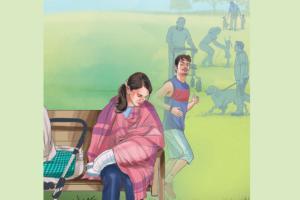Over the years, women have tried to break the taboo surrounding nursing in public, but it's yet to become the norm

Illustration/Uday Mohite
With raging controversies over women posting pictures and getting featured on magazine covers, breastfeeding their babies, the question of the hour is what makes society so intolerant towards something that’s natural. Just as it becomes more important to provide lactating mothers the space and freedom to breastfeed their babies as and when required, mid-day takes a look at the general approach of countries.
ADVERTISEMENT
How other countries view it
Australia: Breastfeeding is a right under the federal Sex Discrimination Act, 1984.
United Kingdom: Equality Act 2010 says treating a woman less favourably just because she is breastfeeding is discrimination.
Philippines: The Expanded Breastfeeding Promotion Act of 2009 protect breastfeeding in public.
Trump says he supports it
According to an NYT report, US negotiators in Geneva had objected to a WHO resolution in support of breastfeeding and had even tried to ‘bully’ other countries into dropping it. But, Trump said US strongly supported breastfeeding.
India’s approach
As India has no laws governing breastfeeding, the prevalence varies from region to region. The biggest problem is lack of awareness. The country is faced with a cultural conundrum — women are expected to keep their bodies covered. Hence, feeding a baby by exposing breasts is considered to be a daring act.
Here it’s not the norm
Atlanta: In 2011, Atlanta issued a law that banned public breastfeeding of children above 2 years of age, as it’s considered to be indecent.
Russia: Breastfeeding in the open is considered controversial, socially unacceptable, and even a taboo in Russia.
Breastfeeding is important
A healthy bay: As it’s the natural first food for babies, it provides all the essential nutrients and energy that the infant needs.
Long-term effects: Breastfeeding can reduce the mother’s chances of developing chronic diseases.
More responsive to vaccines: Research shows that breastfed babies have a better antibody response to vaccines.
Nursing at work
Under The Maternity Benefit (Amendment) Act 2016, employers should give nursing breaks to mothers. These breaks must be available until a child becomes 15 months old.
Let’s break the taboo
Miranda Kerr: Just three months after the Victoria’s secret model welcomed her first child in January 2011, she shared a photo of herself at a photo shoot breastfeeding her baby.
Angelina Jolie: The cover of W magazine’s Nov 2008 issue was all about Jolie’s black-and-white shot feeding her three-month-old twins.
Padma Lakshmi: The chef, host and author shared a throwback photo on her Facebook account, in which she is seen breastfeeding her daughter while putting on mascara.
Making a point
> A Malayalam magazine had landed in hot soup after it featured model Gilu Joseph breastfeeding a baby. Kerala HC rejected a petition filed to sue the model and the editor of the magazine, saying it didn’t think that the cover affected ‘society’s moral fabric’.
> This year the swimsuit runway of Sports Illustrated featured Mara Martin, mother to a five-month-old girl, walking the ramp while breastfeeding her baby.
176
No. of countries that celebrate World Breastfeeding Week
26
Weeks of paid maternity leave under MB Act
92%
Firms that comply with the provisions of Maternity Benefit Act
Catch up on all the latest Crime, National, International and Hatke news here. Also download the new mid-day Android and iOS apps to get latest updates
 Subscribe today by clicking the link and stay updated with the latest news!" Click here!
Subscribe today by clicking the link and stay updated with the latest news!" Click here!






